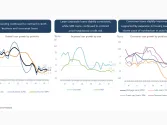
Women occupy less than a quarter of board seats in Singapore: report
Still, achieving gender parity in key leadership roles remains challenging.
Women now hold 23.3% of board seats globally, a 3.6 percentage point increase since 2022, according to Deloitte Global’s latest report.
In Singapore, whilst the percentage of women on boards (20.8%) trails the global average, it surpasses regional averages, indicating steady progress. The Philippines is tied with Singapore in female board chair representation (8.3%).
Achieving gender parity remains challenging, particularly in key leadership roles, Deloitte noted.
The report said that without substantial intervention, gender equality on corporate boards may not materialize until 2038.
Moreover, the path to parity in key leadership positions such as board chairs and chief executive officers appears unclear.
ALSO READ: Talent shortage plagues all industries, women candidates in demand: survey
Anna Marks, chair of Deloitte Global, emphasized the imperative for concerted efforts from various stakeholders to promote diversity within corporate boards.
”Despite that, it is clear that a tangible increase in momentum is needed to reach gender parity in the boardroom,” she said.
“With women currently still underrepresented on company boards globally, that step-change in momentum will require organisations and investors to do more to realise the benefits that diverse boards can bring,” Marks continued.
Whilst government intervention, including quota legislation, has contributed to the progress, further action is still necessary from stakeholders, including investors.
Quota legislation in countries like Belgium, the Netherlands, France, Norway, and Italy has led to high percentages of women on boards, ranging from 33% to 40%. However, progress is not solely due to quotas as government initiatives like targets and disclosures have also reportedly helped.
ALSO READ: What Singapore’s property developers can learn from Japan’s Azabudai Hills
In the United Kingdom and Australia, women now hold over a third of board seats. Concerns about "overboarding" haven't materialized as increasing gender diversity on boards has not led to directors holding too many seats.
Meanwhile, in Southeast Asia, there is a 2.8 percentage point increase, with women now occupying 19.9% of board seats. Malaysia stands out with 28.5% of board seats held by women, propelled by initiatives like the "one woman on board" quota for listed companies.
However, challenges persist, as evidenced by decreases in the percentage of women as board chairs in Malaysia (6.2%) and female CEOs in Singapore (11.9%).
“While many countries in the region do not have legal requirements or quotas for the number of women on boards, this upward trend indicates a growing recognition of the positive impact of gender diversity in the boardroom, which is especially important as organisations respond to new and evolving business challenges,” said Gek Choo, boardroom program leader at Deloitte Southeast Asia and Singapore.


















 Advertise
Advertise









